Key to Unit 1答案
Key to 全新版视听阅读答案 B2 Unit 1
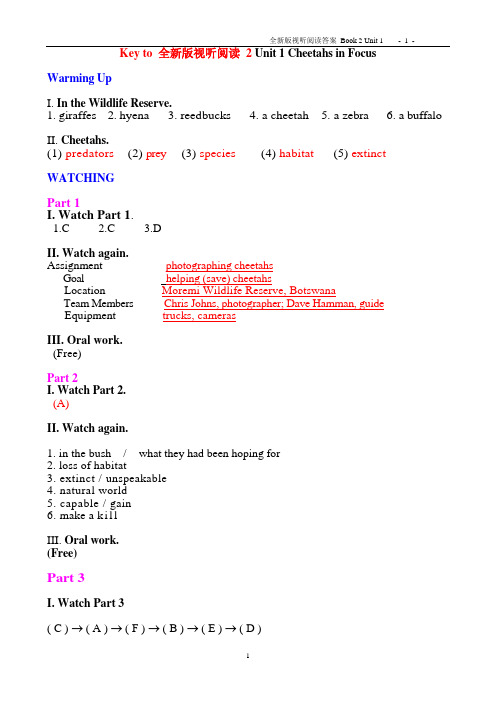
Key to 全新版视听阅读2 Unit 1 Cheetahs in FocusWarming UpI. In the Wildlife Reserve.1. giraffes2. hyena3. reedbucks4. a cheetah5. a zebra6. a buffalo II. Cheetahs.(1) predators (2)prey (3) species (4) habitat (5) extinct WATCHINGPart 1I. Watch Part 1.1.C2.C3.DIII. Oral work.(Free)Part 2I. Watch Part 2.(A)II. Watch again.1. in the bush / what they had been hoping for2. loss of habitat3. extinct / unspeakable4. natural world5. capable / gain6. make a k i l lIII. Oral work.(Free)Part 3I. Watch Part 3( C ) → ( A ) → ( F ) → ( B ) → ( E ) → ( D )II. Watch again1. month---week2. exhausted---fine3. afternoon---morning4. giraffes---reedbucks5. redator---preyIII. Listen and repeat.1. The challenge is to keep your concentration, to constantly look.2. They scan everything from heavy bushes to open grasslands, hoping to catch sight of her.3. Chris must wait to see if the mother cheetah will let him back into her trust.4. The men must drive as quickly as possible in order to get the shot.5. If another predator moved in on her, the mother could be ambushed.Part 4I. Watch Part 41. F2.T3.F4.T5.FII. Watch again(1) clicks (2) focuses (3) freezes (4) walks (5) smell (6) lickIII. Oral work.(Free)Follow-UpI. Watch the entire video.Day 1 GDay 2 B / C / DDay 3 FA week later A / EII.Oral work.(Free)III.Project.(Free)Reading Comprehension1. D2. B3. D4. D5. C6. B7.A8. capturing 9. cautious 10. protectHome ListeningI. Listen to the passage.1. C2.D3.AII. Listen again.1. T2. T3. F4. F5. FIII.Listen and repeat.1. Studies have shown that almost all living things will eventually become extinct.2. In many cases, replacement species emerge over time.3. Human activity is having a tremendous negative impact on extinction rates.4. Some of the world's species cannot survive without help.5. Some groups may have a vested interest in not protecting certain species.IV.Oral work.(Free)。
大学英语之基础英语综合教程答案KeyUnit1
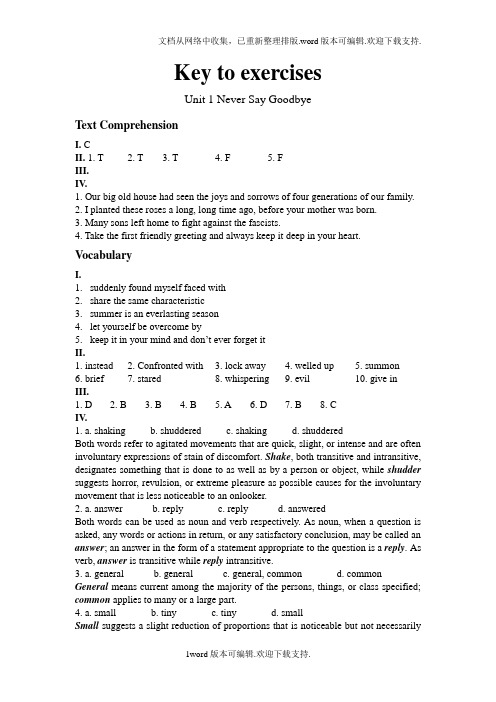
Key to exercisesUnit 1 Never Say GoodbyeText ComprehensionI. CII. 1. T 2. T 3. T 4. F 5. FIII.IV.1. Our big old house had seen the joys and sorrows of four generations of our family.2. I planted these roses a long, long time ago, before your mother was born.3. Many sons left home to fight against the fascists.4. Take the first friendly greeting and always keep it deep in your heart. VocabularyI.1. suddenly found myself faced with2. share the same characteristic3. summer is an everlasting season4. let yourself be overcome by5. keep it in your mind and don’t ever forget itII.1. instead2. Confronted with3. lock away4. welled up5. summon6. brief7. stared8. whispering9. evil 10. give inIII.1. D2. B3. B4. B5. A6. D7. B8. CIV.1. a. shaking b. shuddered c. shaking d. shudderedBoth words refer to agitated movements that are quick, slight, or intense and are often involuntary expressions of stain of discomfort. Shake, both transitive and intransitive, designates something that is done to as well as by a person or object, while shudder suggests horror, revulsion, or extreme pleasure as possible causes for the involuntary movement that is less noticeable to an onlooker.2. a. answer b. reply c. reply d. answeredBoth words can be used as noun and verb respectively. As noun, when a question is asked, any words or actions in return, or any satisfactory conclusion, may be called an answer; an answer in the form of a statement appropriate to the question is a reply. As verb, answer is transitive while reply intransitive.3. a. general b. general c. general, common d. common General means current among the majority of the persons, things, or class specified; common applies to many or a large part.4. a. small b. tiny c. tiny d. smallSmall suggests a slight reduction of proportions that is noticeable but not necessarilyobjectionable, while tiny refers to so drastic a reduction of scale as to put the thing described outside established norms, as well as suggesting a miniature or model of something.V.1. pain, grief, sorrow, agony2. loudly, harshly, roughly3. sorrow, grief, dismay4. inconspicuously, unnoticeably5. small, little6. meet, gather7. seriously, severely, hopelessly8. lengthy, longVI.1. industrial2. description3. suspicion4. assistant5. unemployed6. proof7. examination8. furtherGrammarI.1.were bathing, were looking, were playing2.was sitting, was reading3.was leaving, was, arrived, learned, had left, found, had used4.were playing, heard, hid, took5.was crying, stepped, was going, managed, didn’t hit6.gave, thanked, said, had enjoyed, knew, had not read, were7.had played, reached, entered8.was running, struckII.left, spent, had been travelling, appeared, was, were crossing, couldarrived, was sleeping, stopped, came, were getting, was, had not arrived, would be III.1. talked → was talking2. (correct)2. had remembered→remembered 4. was working→ had been working5. had resigned→ resigned6. (correct)7. (correct) 8. (correct)IV.1.take2. to play3. lifted, thrown4.barking5. played6. to say7. beaten8. bite, slither9. drop 10. lyingV.1.Poor as he was, he was honest.2.Terrible as the storm was, we continued our journey.3.Hard as he tried, he was unable to make much progress.4.Tired as I was, I went on working.5.Much as I would like to help you, I’m afraid I’m simply too busy at the moment.6.Much as I admire him as a writer, I do not like him as a man.7.Strong as / though he was, Tom couldn’t lift it.8.Bravely as / though they fought, they had no chance of winningTranslationI.1. 我10岁那年,突然要搬家,从我唯一知道的家搬走,我心中痛苦万分。
Key-to-Unit1

I. A brief introduction to1.Alex Palmer Haley (1921- 1992)American biographer, scriptwriter, and novelist, whose most famous work is ROOTS, a publishing phenomenon and international bestseller. Haley traced in it his ancestry back to Africa and covered seven American generations, starting from his ancestor, Kunta Kinte. The book was adapted to television series, and woke up an interest in genealogy, particularly among African-Americans. Haley himself commented that the novel was not so much history as a study of mythmaking: "What Roots gets at in whatever form, is that it touches the pulse of how alike we human beings are when you get down to the bottom, beneath these man-imposed differences."When Roots appeared in 1976, it gained both critical and popular success, although the truth and originality of the book raised some doubts. James Baldwin concluded in his New York Times review, that the novel suggests how each of us are vehicle of the history which have produced us. On the other hand - representing a minority opinion - Michael Arled dismissed the book and television series as Haley's own fantasies about 'going home.'The story starts from Juffure, a small peaceful village in West Africa in 1750, and ends in Gambia, in the same village, after several generations. However, Haley did not claim that it is possible to return to some Paradise, but depicted realistically his ancestors' life and how the villagers suffered occasionally from shortage of food.2. Greenwich VillageGreenwich Village(pronounced /ˌɡrɛnɪtʃˈvɪlɪdʒ/), often simply called "the Village", is a largely residential neighborhood on the west side of Lower Manhattan in New York City. A large majority of the district is home to upper middle class families.3. Pulitzer PrizeA Pulitzer Prize is an American prize awarded for distinction in the arts. The Pulitzer Prizes are particularly associated with journalism, but prizes are also awarded in the fields of music and literature. A win is a great honor, especially for a newspaper, with the all time record for Pulitzer Prizes held by the New York Times, with 95 collective Pulitzers as of 2007. Incidentally, the pronunciation, according to Columbia University, is “pull it sir.”The prizes are named for Joseph Pulitzer, a prominent late 19th and early 20th century journalist who revolutionized the New York World, a major New York City newspaper. Under Pulitzer, the paper became renowned for hard-hitting investigative journalism, and it also contributed to public service through a variety of public campaigns. One year after Pulitzer's death in 1911, the Columbia University School of Journalism was founded, and in 1917 the first Pulitzer Prizes were awarded by a panel of judges drawn from this institution and “persons of distinction.” The Pulitzer board continues to include academics and scholars from Columbia University, as well as prestigious members of the news community.4. NAACPThe National Association for the Advancement of Colored People, usually abbreviated as NAACP and pronounced N-double-A-C-P, is one of the oldest and most influential civil rights organizations in the United States. Its mission is "to ensure the political, educational, social, and economic equality of rights of all persons and to eliminate racial hatred and racial discrimination".Its name, retained in accord with tradition, is one of the last surviving uses of the term colored people.The NAACP bestows the annual Image Awards for achievement in the arts and entertainment, and the annual Spingarn Medals for outstanding positive achievement of any kind, on deserving African Americans. It has its headquarters in Baltimore, Maryland.II. Essence for this unitMain idea: Haley recalled how he kept writing in spite of setbacks and poverty and succeeded in becoming a writer at last.---it takes Haley the courage and persistence to stay the course in the Shadowland.III.New words1. requite vt. repay; give in return2. prospect n.: sth. expected, hoped for, looked forward to3. siren n. : device for producing a loud shrill noise as a warning4. station vt. : put sb., oneself , a military, a naval force at or ina certain place5.tease v. : make fun of (sb.) playfully or unkindly6.crumpled adj.: folded and creased7.veteran n. : a person who has had much or long exoerience,esp. as a soldier8.morsel n.: tiny piece of,9.wilt vt.: lose freshness10. dazzling adj.: not see clearly because of having too muclight11. limelight n.: intense white light produced by …12. exhilarate v.: (usu. passive) fill with high spirits, much excite13. corrod vt.: wear away slowly by chemical action or disease14.riptide n.: rough tideIV. Phrases & expressions1.cherish the fond dream of becoming…: the nice dream of …( a fond mother/ fond looks: loving and kind; fond hopes/ambitions:~held, but unlikely to be realized )2.Many a person does sth….3.encourage sb. to do sth./ discourage sb. from doing sth….4.The reality is that writing is a lonely, private and poor-payingaffair.( Trans: .) 5.For every writer kissed by fortune there are thousands morewhose longing is never requited.requite vt. repay; give in returne.g. ~ kindness with ingratitude~ an obligation6.When I left a 20-year-career in the … freelance writer, I hadno prospects at all.sth. expected, hoped for, looked forward toe.g. The ~s for the wine harvest are poor this year.The manager held out bright ~s to me if I would accept the position.7.It was the opposite--- a kind of siren call tempting me to giveup my dream.siren: device for producing a loud shrill noise as a warningshrill: sharp; piercing; high-pitchede.g. an air-raid siren8.On the phone was an old acquaintance from the Coast Guard,now stationed in San Francisco.station vt. : put sb., oneself , a military, a naval force at or in a certain place● stationary adj. 1)not intended to be moved fromplace to place 2) not moving or changing● stationery n.[U] writing materials, etc.9.egg sb. about/ on sth. ( egg sb. to do sth.) : persistently urgesb. to do sth.10.t ease: make fun of (sb.) playfully or unkindlye.g. You must never ~ a child because it stutters.teaser n. a person…A real man doesn’t tease those underdogs, but protects them.11.N ext time I make a sale.: Next time I make a deal (heremeans sell out some works of writing)12.That was real money in 1960.13.What’s more, I could write on the side.on the side: as a part-time job/ as a secondary occupationside by side: close together, for mutual supportby the side of, by one’s side: close to and compared withon the right (wrong) side of (fifty): below (above) ( 50 years of age)take sb. on one side: take sb. aside, aparttake sides with: support (sb. , a party ) in a dispute14.From deep inside a bull-headed resolution welled up.well up: flow (up, out) as water flows from a wellcome up, risefirm15.“ I am going to stick it out and write.”stick out: (cause to) project, stand oute.g. He sticked his tongue out at his sister.stick one’s head out of the carriage windowstick it out: endure hardship, etc. until the end16. a crumpled paper bag: a folded and creased paper bag17.…I had George to help me over the rough spots:help sb. with sth.help sb. outhelp sb. over sth.rough spots:18.… I met other struggling artists like Joe Delaney, a veteranpainter from Knoxville, Tenn.artists who make great effortsveteran: a person who has had much or long exoerience, esp. as a soldier~s of two World Wars( U.S.A.) any ex-service man19.…bones with morsels of meat: tiny piece of,20.…some wilted vegetables: wilt: lose freshness21.…make down-home soup: soup usually made at home22.…a struggling restaurant: poorly-run23.… in chains: kept as a prisoner or slave with chains24.The shadows had turned into dazzling limelight:dazzling: not see clearly because of having too much lightlimelight: intense white light produced by …e.g. in the limelight: receiving great publicitydazzling limelight: the center of public attention25.It was a confusing, exhilarating time, and in a sense I wasblinded by the light of my success.:exhilarate: (usu. passive) fill with high spirits, much excite be blinded: be taken away power of judgement26.…, and there were two corroded sardine cans, a nickel, adime and three pennies.corrod: wear away slowly by chemical action or disease27.Suddenly the past came flooding in like a riptide.: roughtide28.…huddled over the typewriter…: sat huddled up over thetypewriterhuddle: draw the knees up to the bodye.g. He lay huddled up in bed.▲自传性文章的阅读(传记阅读指导)一、传记的定义和分类传记是遵循真实性原则,用形象化的方法记述人物的生活经历、精神风貌以及其历史背景的一种叙事性文体。
Key to Unit One, Listening and Speaking英语听力第一单元答案

Key to Task 2, Part A
3. Identify areas where you need support (time management, study skills, writing, etc.) and ask for help. Ask your professor where to find help or seek information through Student Services. 4. Keep your opinions open by maintaining good grades that will allow your entrance into further study. 5. Plan study time within your day. If you have an hour between classes, go to the library and review your notes.
Unit One
New Beginnings
Getting Ready
• Warm-Up Speaking • Vocabart A
1.Classes are usually bigger and there are a lot more students on campus. 2. Instruction is mainly given by using a lecture method with students taking notes. 3. Students need to be more self-directed and are expected to be more independent. 4. Students’ progress and attendance are not closely monitored by the instructors. 5. There is less contact with instructors, less individual feedback and less time spent in class. 6. Group projects are often required, so you will have to work well with other students.
key to homework unit 1
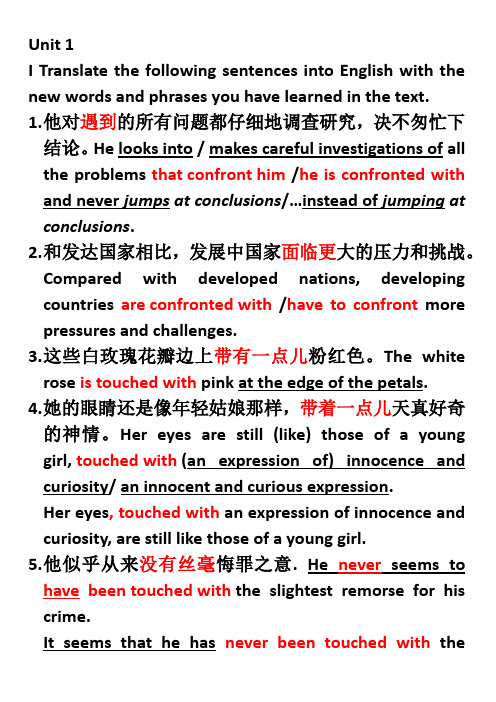
Unit 1I Translate the following sentences into English with the new words and phrases you have learned in the text.1.他对遇到的所有问题都仔细地调查研究,决不匆忙下结论。
He looks into / makes careful investigations of all the problems that confront him /he is confronted with and never jumps at conclusions/…instead of jumping at conclusions.2.和发达国家相比,发展中国家面临更大的压力和挑战。
Compared with developed nations, developing countries are confronted with/have to confront more pressures and challenges.3.这些白玫瑰花瓣边上带有一点儿粉红色。
The white rose is touched with pink at the edge of the petals.4.她的眼睛还是像年轻姑娘那样,带着一点儿天真好奇的神情。
Her eyes are still (like) those of a young girl, touched with (an expression of) innocence and curiosity/ an innocent and curious expression.Her eyes, touched with an expression of innocence and curiosity, are still like those of a young girl.5.他似乎从来没有丝毫悔罪之意. He never seems to have been touched with the slightest remorse for his crime.It seems that he has never been touched with theslightest remorse…6.他刚转过身,一只手落到他的肩头上,把他吓了一跳。
《英语短篇小说教程》练习参考答案unit1

《英语短篇小说教程》练习参考答案Keys to Unit OneLangston Hughes: Early Autumn1)Opinions of Understanding:(1) What was probably untrue of Mary?A. She missed the days of the past.B. She still loved Bill.C. She worked to keep a family of three children.D. She was satisfied with her life and job in New York.(2) Which of the following adjectives can probably best describe Bill’s attitude?A. Emotional.B. Indifferent.C. Puzzled.D. Hopeful.(3) Mary didn’t say anything when she got on the bus. Why?A. She had nothing more to say.B. She was disappointed in Bill.C. She was too emotional.D. She knew the situation was hopeless.(4) The last sentence of the story “she had forgotten …to tell him that her youngest boy was named Bill, too” shows that ________.A. Mary knew she would meet Bill again some day.B. “Bill” is a very common name.C. Mary had been thinking about Bill and still loved him.D. Mary was proud of her youngest son.(5) The title of the short story “Early Autumn” may suggest to the reader that _______.A. the bitterness of an emotional long winter was aheadB. it was still the bright time of one’s life, like early AutumnC. both Mary and Bill were now middle-aged peopleD. the love between them was not as “hot” as summer days2) Questions for Discussion(Suggested answers for reference):(1) Can you pick out words and sentences to show that Mary and Bill were now different in their attitudes toward each other?1) Mary: …she saw him for the first time in years. (line 5)Bill: At first he did not reco gnize her… (line 8)2) Mary: Unconsciously, she lifted her face as though wanting a kiss… (line 11)Bill: …but he held out his hand. (line 12)3) Mary: “I live in New York now,” she said. (eagerly telling him her address) (line 14)Bill: “Oh” – smiling politely, then a little frown came quickly between his eyes. (having no interested in her living place now.) (lines 15-16)4) Mary: “Married yet?” (concerning keenly about his marital status) (line 21)Bill: “Sure. Two kids.”(being satisfied with his present situation and showing pride in mentioning his family.) (line 22)5) Bill: “And your husband?” he asked her. (not noticing her subtle emotional change.) (line 27)Mary: “We have three children. I work in the bursar’s office at Columbia” (avoiding mentioning her husband in her reply). (line 28)6) Bill: “You’re looking very …” (he wanted to say old) “… well,” he said. (not being sensitive to her condition.) (line 29)Mary: She understood. (being very sensitive to her own condition.) (line 30)7) Mary: “We live on Central Park West,” she said. “Come and see us sometime.”(offering a direct invitation.) (line 33)Bill: “Sure,” he replied. “You and your husband must have dinner w ith my family some night. Any night. Lucille and I’d love to have you.”(giving a polite indirect rejection.) (lines 34-35)8) Mary: “There’s my bus,” she said. (line 42)Bill: He held out his hand, “Good-by.” (ready to part with Mary.) (line 43)Mary: “When …” she wanted to say… (not ready to part with Bill) (line 44)(2) Several times the author describes the scene on Washington Square: the dusk, the chilly weather, the falling leaves, the passing people. Does he only want to tell us where and when the story takes place? What other effects do such descriptions achieve?(The description of the setting gives the reader a feeling of sadness and depression. It was getting dark and getting cold with leaves falling. The bright daytime was over and the unpleasant darkness was ahead, and the warm and comfortable summer and early autumn days were being replaced by the cold and long winter. The setting echoes and reinforces Mary’s feelings of regret and yearning and implies the emotional crisis that she might have to face.)3) Explanation and Interpretation:(Explain the implied meaning of the following sentences, and point out their significance in the context of the story.)1) Impulsively, she had married a man she thought she loved.(Notice the two key words: “impulsively”and “thought.”This has direct relation to her reactions at Washington Square, New York, years later. She made an impulsive decision and theman she “thought” she loved was not the man she wanted to be a life partner with.)2) Unconsciously, she lifted her face as though wanting a kiss, but he held out his hand.(Her unconscious reaction reveals that their sweet love in the past had been kept alive in Mary’s memory for all these years, but Bill had undergone a total change, treating her as an ordinary acquaintance of the past.)3) “And your husband?” he asked her.“We have three children. I work in the bursar’s office at Columbia.”(This is the first time Bill initiated the conversation, but he had failed to notice the signs in Mary’s emotional reaction and asked a question he should have not asked. Mary avoided the question by talking about something else. Why did she avoid mentioning her husband? There is message in the avoidance.)4) The lights on the avenue blurred, twinkled, blurred.(The vision came from Mary’s eyes. Obviously, her eyes were now filled with tears.)5) The bus started. People came between them outside, people crossing the street, people theydidn’t know. Space and people.(A lot of people had walked into their lives, Mary and Bill’s family members and their respective circle of friends and colleagues. It was no longer their world of two young lovers when they were in Ohio.)4) Suggested Homework:Suppose you were Bill Walker and you had a habit of writing down what happened to you in your diary. After the chance meeting with Mary at Washington Square, you went home and wrote a brief paragraph about the meeting. The paragraph may begin like this:Oct. 11, 2009I had never expected to see Mary, but I met her at Washington Square. She looked rather old to me – I didn’t even recognize her immediately…For reference only:Oct. 11, 2009(I had never expected to see Mary, but I met her at Washington Square. She looked rather old to me – I didn’t even recognize her immediately. It was quite a surprise that she could pick me out among the hustling and bustling crowd in the street. After all, it has been quite a few years since we parted -- Eight, nine, or ten years? Time flies and we both changed a lot, no longer the heady, impulsive kind of youngsters that we once were. For some reason, she seemed rather emotional about this chance meeting, and was keen in knowing about what had happened to me in these years and in telling and inviting me to her place. Somehow, she avoided mentioning her husband, the man she quickly married after we ran into a little problem in our relationship. Tenyears is a long time, enough to reshape a person’s life. I wish her and her family all the happiness, sincerely.)。
全新版大学英语第三册 Unit 1 课后习题答案
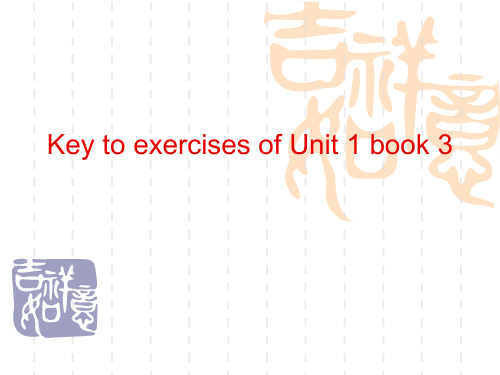
Hardships working hard both in winter and in summer harsh environment and weather condition anxious moments after the writer quit his job cutting back on daily expenses solitude
Байду номын сангаас
23. 怆然离去 leave with a feeling of sorrow 24. 自豪感 a sense of pride 25. 一旦形势好转 once economic conditions improve 26. 赚钱 earn money
The Countryside The countryside of Britain is well known for its beauty and many contrasts: its bare mountains and moorland, its lakes, rivers and woods, and its long, often wild coastline. Many of the most beautiful areas are national parks and are protected from development. When British people think of farmland, as well as open spaces, they imagine cows or sheep in green fields enclosed by hedges or stone walls, and fields of wheat and barley.
Key_to_Unit_1_Never_Say_Goodbye练习答案综合教程一
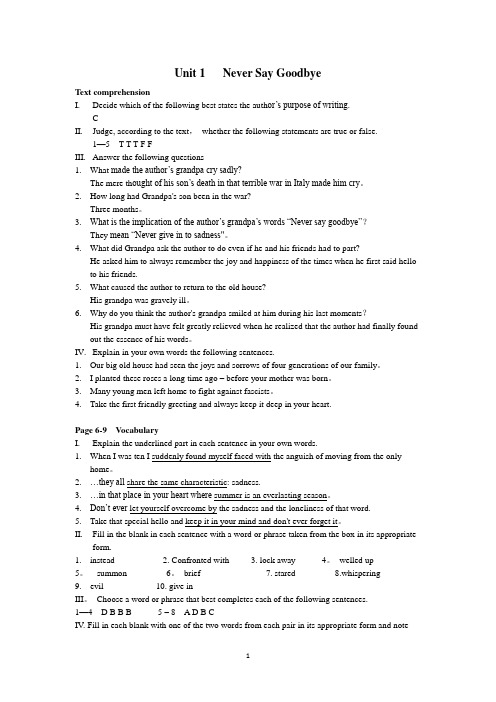
Unit 1 Never Say GoodbyeText comprehensionI.Decide which of the following best states the auth or’s purpose of writing.CII.Judge, according to the text,whether the following statements are true or false.1—5 T T T F FIII.Answer the following questions1.What made the author’s grandpa cry sadly?The mere th ought of his son’s death in that terrible war in Italy made him cry。
2.How long had Grandpa's son been in the war?Three months。
3.What is the implication of the author’s grandpa’s words “Never say goodbye”?They mean “Never give in to sadness"。
4.What did Grandpa ask the author to do even if he and his friends had to part?He asked him to always remember the joy and happiness of the times when he first said hello to his friends.5.What caused the author to return to the old house?His grandpa was gravely ill。
- 1、下载文档前请自行甄别文档内容的完整性,平台不提供额外的编辑、内容补充、找答案等附加服务。
- 2、"仅部分预览"的文档,不可在线预览部分如存在完整性等问题,可反馈申请退款(可完整预览的文档不适用该条件!)。
- 3、如文档侵犯您的权益,请联系客服反馈,我们会尽快为您处理(人工客服工作时间:9:00-18:30)。
Key to Unit 1
Vocabulary
I.
1.1) insert 2) on occasion 3) investigate 4) In retrospect
5) initial 6) phenomena 7) attached 8) make up for
9) is awaiting 10) not…in the least 11) promote
12) emerged
2. 1) There is a striking contrast between the standards of living in the north of the country and the south.
2) Natural fiber is said to be superior to synthetic fiber.
3) The city’s importance as a financial center has evolved slowly.
4) His nationality is not relevant to whether he is a good lawyer.
5) The poems by a little-known sixteenth-century Italian poet have found their way into some English magazines. 3. 1) be picked up, can’t accomplish, am exaggerating
2) somewhat, performance, have neglected, they apply to
3) assist, On the other hand, are valid, a superior
II.
1. 1) continual 2) continuous 3) continual 4) continuous
2. 1) principal 2) principal 3) principle 4) principles
5) principal
III.
1. themselves
2. himself/herself
3. herself/by herself/on her own
4. itself
5. ourselves
6. yourself/ by yourself/on your own
Comprehensive Exercise
I. Cloze
1. 1) contrast 2) exaggerating 3) priority
4) on the other hand 5) promoting 6) pick up
7) assist 8) accomplish 9) on occasion 10) neglecting 11) worthwhile 12) superior
2. 1) end 2) perform 3) facing 4) competent 5) equipped 6) designed 7) approach 8) rest 9) definitely 10) quality
II. Translation
1.1) It takes an enormous amount of courage to make a departure from the tradition.
2) Tom used to be very shy, but this time he was bold enough to give a performance in front of a large audience.
3) Many educators think it desirable to foster the creative spirit in the child at an early age.
4) Assuming (that) this painting really is a masterpiece,
do you think it’s worthwhile to buy/purchase it?
5) If the data is statistically valid, it will throw light on the problem we are investigating.
2. To improve our English, it is critical to do more
reading, writing, listening and speaking. Besides, learning by heart as many well-written essays as possible is also very important. Without an enormous store of good English writing in your head you cannot express yourself freely in English. It is also helpful to summarize our experience as we go along, for in so doing, we can figure out which way of learning is more effective and will produce the most desirable result. As long as we keep working hard on it, we will in due course accomplish the task of mastering English.。
